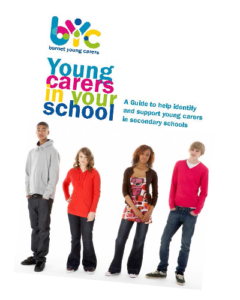barnet young carers
Why are many young carers hidden?There are many reasons why young carers remain hidden. Some to do with the way the young person regards their role and some to do with the way that young carers are viewed. Some reasons include:
- Young carers do not realise that they are a carer or that their life is different to their peers
- The condition of the person they care for is not obvious so people don’t think that the young person needs any help
- They don’t want to be any different from their peers so they don’t draw attention to their caring role
- They want to keep their identity at school separate from their caring role
- It’s not the sort of thing they feel they can discuss with their friends
- There has been no opportunity to share their story
- They are worried about bullying
- They worry that the family will be split up and that they will be taken into care
- They want to keep caring a secret and/or are embarrassed
- They see no reason to tell their story and don’t believe that any positive action will occur as a result of doing so
POTENTIAL INDICATORS OF A YOUNG CARER
Many young carers remain unidentified and schools can play a pivotal role helping to identify them and then referring them on for support. There are a wide range of indicators that might point towards a child being a young carer. The signs that a child or young person may be a young carer may of course also be indicators of many other issues. However, knowing these signs can help staff to build up a picture of a pupil and ask the right questions to reveal that a pupil is a young carer.
The person being cared for
Are parents (or another relative):
-
Disabled or do they have an illness or addiction problem? (Remember that not all children who have a family member who is ill or disabled or has an addiction problem is a young carer).
-
Difficult to engage with?
-
Not attending parent’s evenings?
-
Not communicating with school?
-
On low incomes, and unable to afford school related expenses? This may be because of disability related unemployment.
-
Often late or missing days or weeks off school for no reason?
-
Often tired, anxious or withdrawn?
-
Having problems socially or with making friends? Conversely, do they get on well with adults and present as very mature for their age?
-
A victim of bullying?
-
Depressed?
-
Finding it difficult to concentrate on their work?
-
Having difficulty in joining in extracurricular activities or unable to attend school trips?
-
Isolated?
-
Not handing in their homework/coursework on time, or completing it late and to a low standard?
-
Anxious or concerned about an ill or disabled relative?
-
Displaying behavioural problems?
-
Having physical problems such as back pain (perhaps from heavy lifting)?
-
Secretive about home life?
-
Showing signs of physical neglect or poor diet, for example hungry, thin or lacking clean uniform?
-
Listed as a Child in Need, subject to a Child Protection plan, or Looked-after Child Plan where parental ill health or addiction issues are involved?
-
A sibling of a pupil at your school who is registered with disabilities or ongoing health problems, including mental ill health? (Refer to your SEN Disability Register and School Census data).
RESOURCES
Download to support young carers in your school

We have resources for both secondary and primary schools including information booklets, posters and postcards. These are available to download or order here.




